We admire successful individuals, follow their stories, and even dream of similar success—yet most of us fail to truly learn from top achievers. What’s stopping us? From hidden psychological barriers to overlooked learning hacks, this post reveals what’s holding you back and how to fix it.
Personal Development for Rational Minds
No More Overworking: Strategies for Sustainable Productivity
If you’re a knowledge worker—be it an academic, streamer, author, artist, or consultant— it is very likely that you largely possess the autonomy to structure your time and priorities. While this freedom offers immense potential, it frequently engenders an unintended consequence: overworking.
You might say that you overwork because you want to do a great job. I don’t doubt your good intentions. However, this compulsion to extend working hours often erodes productivity and the quality of your output (and life!) over the long run.
So, how can you be very productive without overworking at all?
Let’s start by understanding the dynamics of overworking as it is the first step toward crafting a sustainable and productive workflow.
Later, I will provide useful strategies to transform your current working patterns into a productive and sustainable routine.
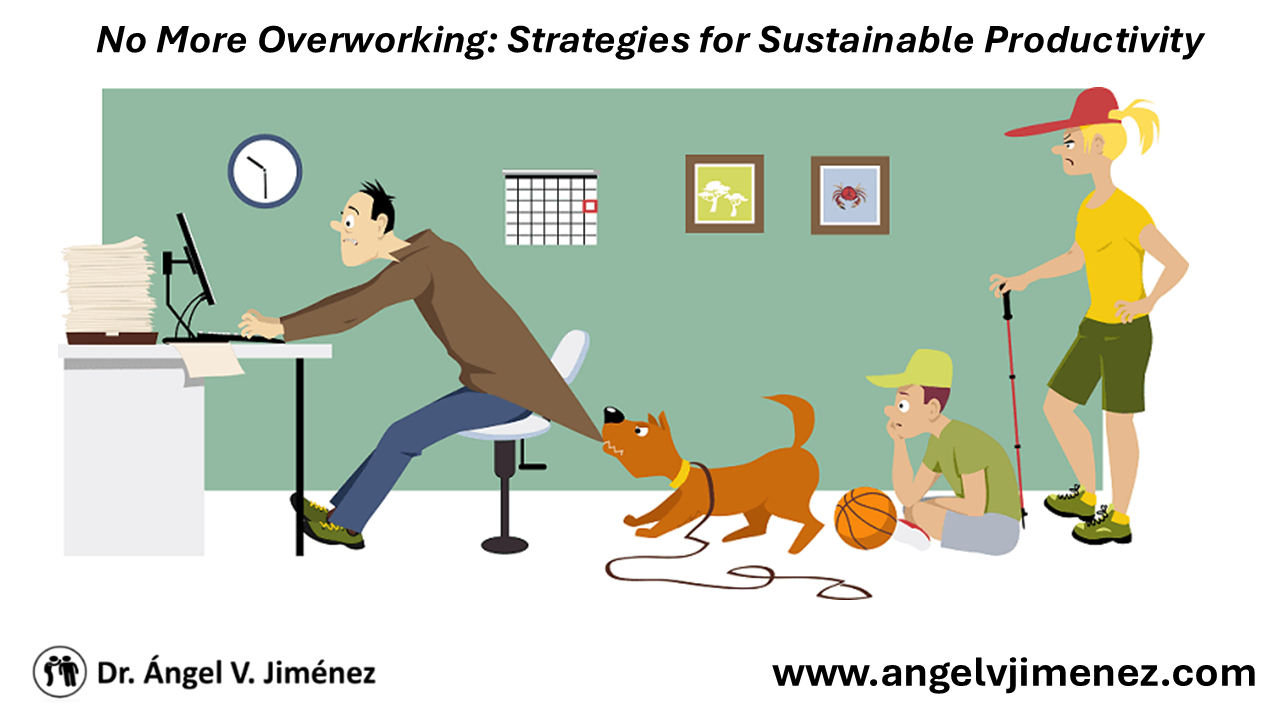
1. Understanding the Problem: The Vicious Cycle of Overworking
Overworking is not an isolated behaviour; it forms part of a self-perpetuating cycle, where interconnected components mutually reinforce one another. See Figure 1.
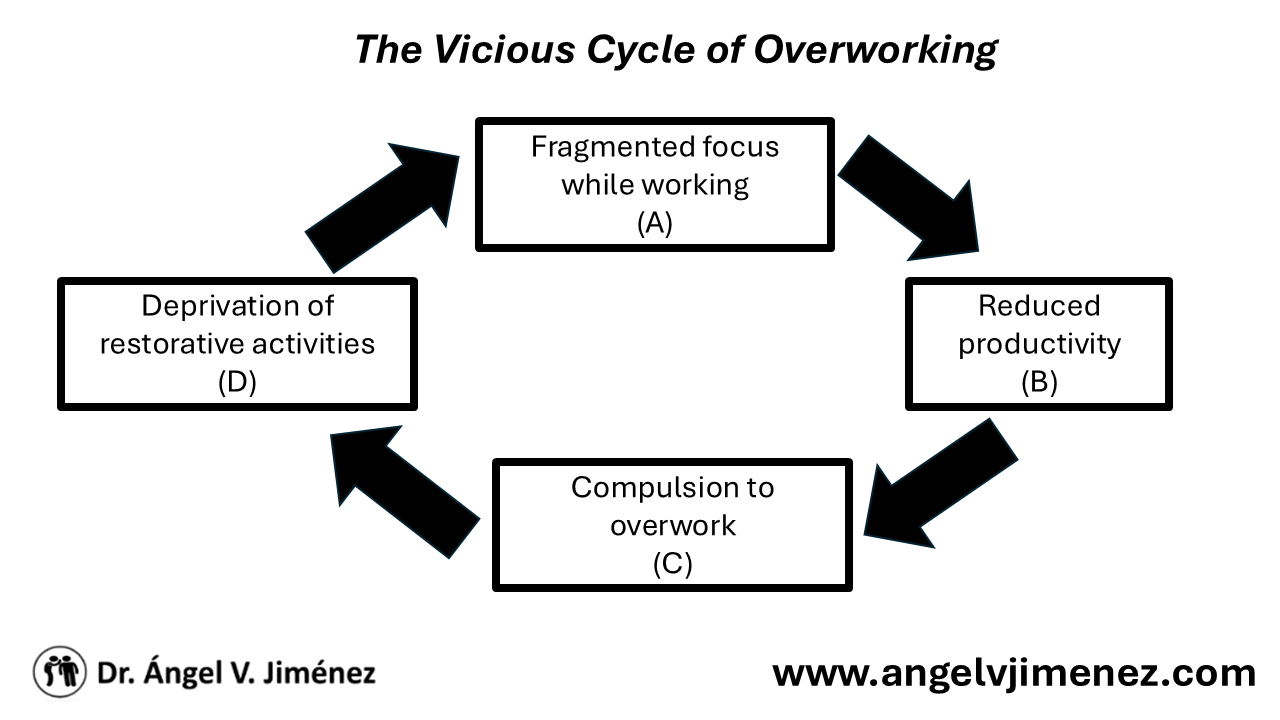
Figure 1: The Vicious Cycle of Overworking
To unpick the vicious cycle of overworking, we could start with any of its components. For convenience, let’s start with Fragmented focus while working (A in Figure 1)
1.1.- Fragmented Focus While Working
Fragmented focus (A in Figure 1) refers to a state of working where attention is continuously disrupted by distractions or interruptions.
These distractions could be external such as hearing a conversation in a co-working space or receiving the notification of a new email in your inbox.
They can also be internal. For example, if you have recently broken up with your partner, it’s likely that thoughts about your ex pop into your head while doing other tasks.
1.2.- Reduced Productivity
The obvious consequence of fragmented focus while working (A) is being less productive (B in Figure 1), that is, getting less of the important work done per hour or completing it to a lower standard.
By ‘important work’ I specifically refer to the part of your work that is the main focus of your profession. The main focus of being an author is writing books. The main focus of being a composer is to compose songs. The main focus of being a scientist is to conduct scientific studies.
Replying to emails and engaging with social media might be some of the activities you do for your work. There might be valid reasons to do so, such as advertising your projects or getting contracts. However, replying to emails or engaging with social media is not the main focus of knowledge professions such as the ones in the example above.
1.3.- Increased Compulsion to Overwork
The consequence of decreased productivity (B) is an increased compulsion to overwork (C in Figure 1).
You have an important deadline coming soon, so you decide to work at the weekend. You feel your boss is going to be angry because you haven’t finished the report you started last week. So, you stay longer at the office.
1.4. Deprivation of Restorative Activities
This reactive approach to work makes you dedicate less time to restorative activities (D in Figure 1), such as going for a walk or socializing with your friends.
Missing these kinds of activities not only reduces your quality of life, but it also makes it more likely that your focus is fragmented during work (A) because you are more tired and stressed.
This, in turn, fuels the vicious cycle of overworking.
The cycle repeats again and again.
You are miserable. You hate your job. You hardly move. You get fat. Your health deteriorates.
You have become a desk potato.
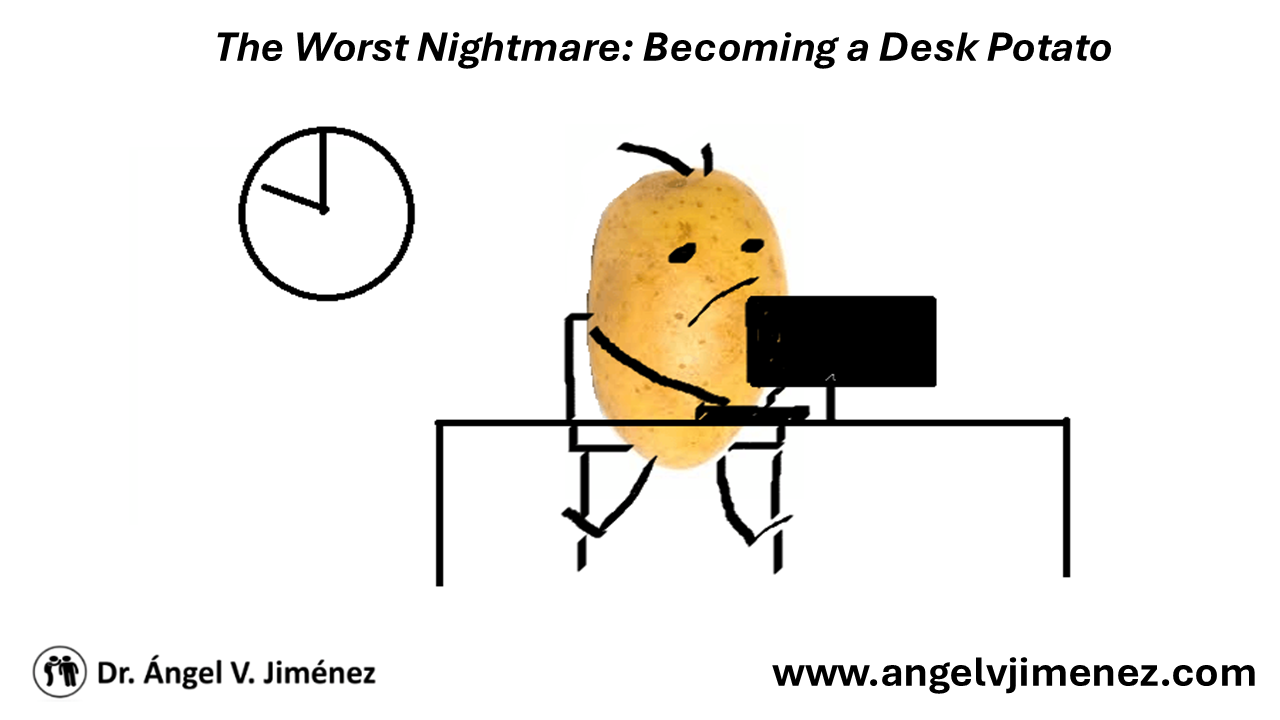
Figure 2. Overworking desk potato
But things don’t have to be this way.
3. The Constructive Alternative: The Virtuous Cycle of Focused Work
Fortunately, the cycle of knowledge work can have a very different dynamic. It can be a virtuous cycle. See figure below.
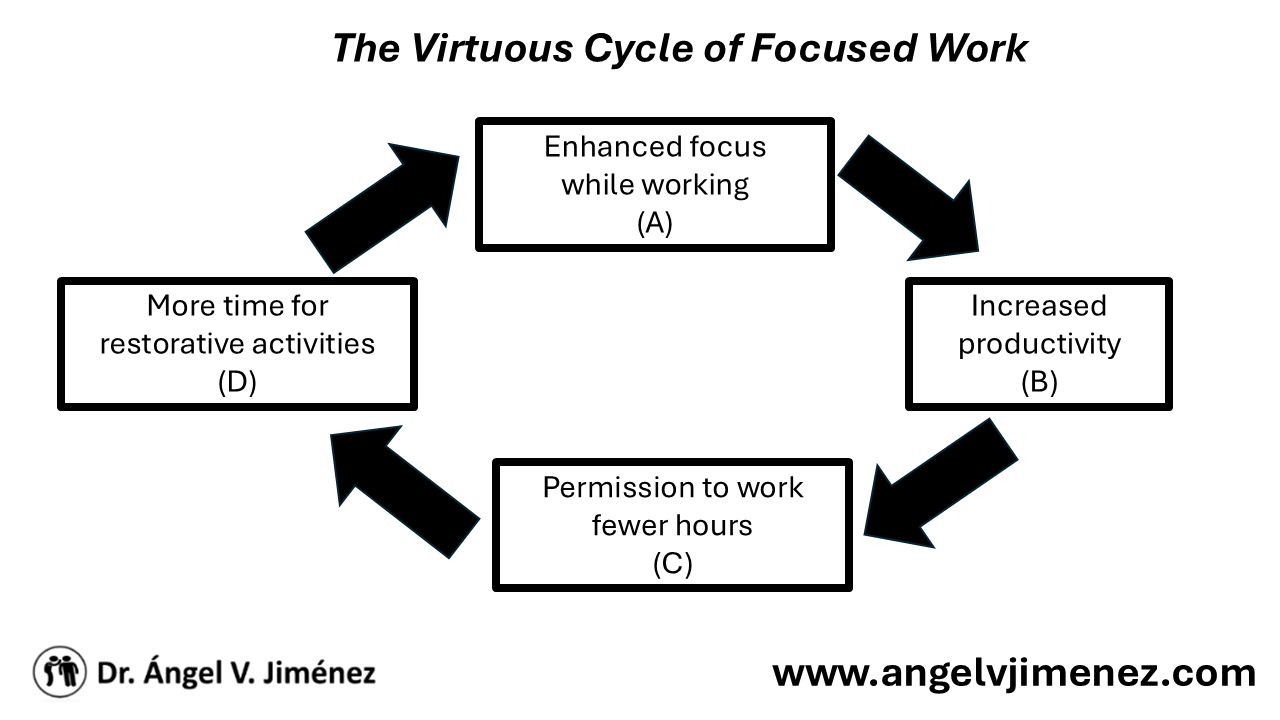
Figure 3. The Virtuous Cycle of Focused Work
In the virtuous cycle of focused work, you display an enhanced focus (A in Figure 3). By eliminating distractions, you achieve deep engagement with your work.
This concentrated effort yields higher quality outcomes in shorter timeframes, increasing your productivity (B in Figure 3).
Becoming more productive gives you permission to work fewer hours (C in Figure 3), instead of falling prey to the compulsion to overwork.
By working fewer hours, you have more time to do restorative activities (D in Figure 3), which helps you to be more focused during work (A in Figure 3) and continue fuelling the virtuous cycle.
At this point, you might be eager to know how you could ensure that your work dynamics resemble the virtuous cycle instead of the vicious cycle… That’s the topic of the following section!
4. Actionable Strategies for Transforming Work Habits to Attain Sustainable Productivity
As you can imagine, transitioning to this virtuous cycle demands deliberate intervention, but its dividends — greater output, reduced stress, and holistic balance — are profound.
It supports an environment where innovation can thrive, bolstering not just immediate results but also sustainable success.
In this section, I will present actionable strategies designed to address specific elements of the vicious cycle. These targeted interventions will empower you to transition from a self-perpetuating loop of overworking to a balanced and productive virtuous cycle of focused work.
4.1. Strategies to Cultivate a Focused Work Environment
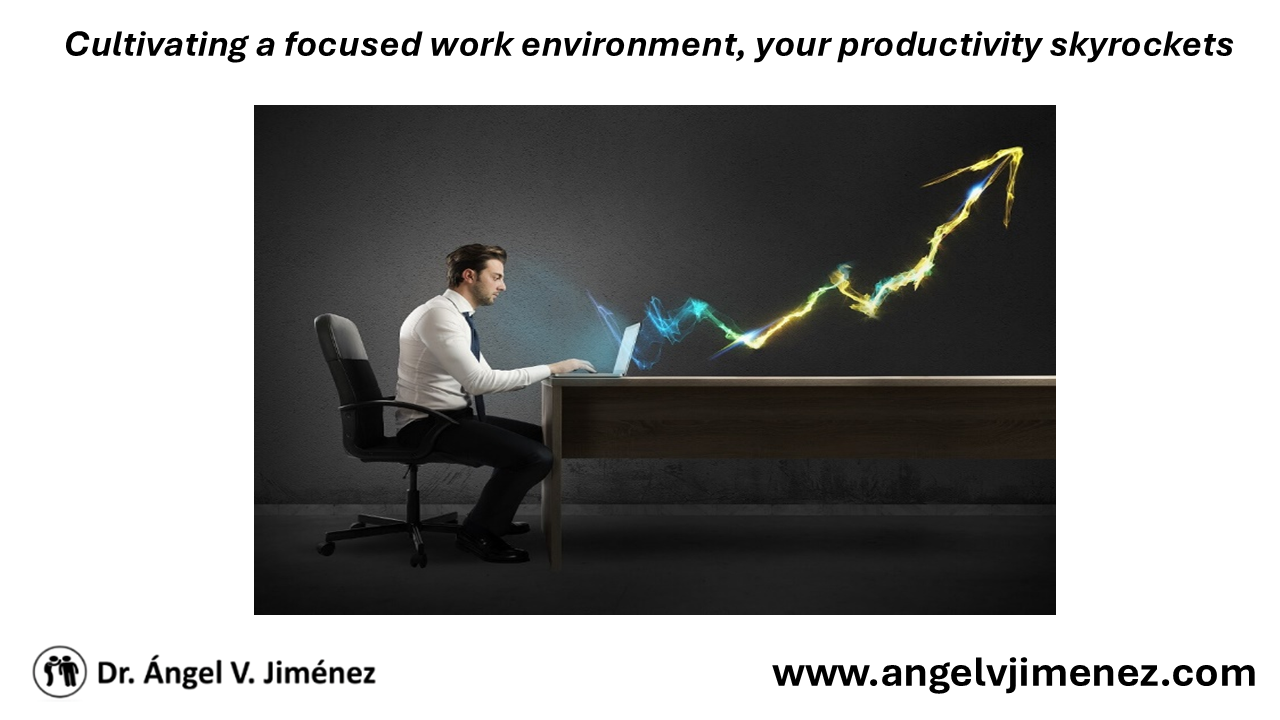
Distraction is antithetical to meaningful work. To mitigate the effects of fragmented focus, three strategies are especially useful:
- Eliminate Distractions by Optimizing Your Workspace
- Segment Collaborative and Solo Tasks
- Embrace Rituals for Transition
4.1.1. How to Eliminate Distractions to Optimize Your Workspace
This strategy directly tackles fragmented focus during work. Because external distractions are often the main cause of fragmented focus, eliminating them as much as possible during the time you are working on the main focus of your job will increase your concentration and, consequently, the quantity and/or quality of your output.
To do this, you need to work in a quiet space, meaning no noise, no music, and no people talking around you. For example, a quiet room in your house, a silent area in a library, or your personal office.
Since your phone is likely one of the worst distractions, it is key to put it away. I find it useful to place it in a different room, or, if that’s not possible, in a drawer or locker. Obviously, you should also set it to silent mode or airplane mode to avoid being disturbed by calls, messages, and notifications.
The internet on your computer could also be a major distraction. Depending on the nature of your job, you might be able to avoid using it altogether while working on the main focus of your work. If this applies to you, go for it!
For example, in the final months of my PhD, when I was primarily conducting statistical analyses and writing, I stored all the necessary information on my computer and worked in a house without an internet connection.
If you need access to specific websites or software requiring an internet connection, consider using internet-blocking software such as Freedom or Cold Turkey. These tools allow you to:
- Block specific distracting websites, such as Facebook or Instagram.
- Block all websites except those necessary for the main focus of your job.
- Create recurring schedules with different blocking settings for various chunks of time.
Experiment with these options to determine which fits your needs best.
4.1.2. How to Segment Collaborative and Solo Tasks
You might be thinking, “Eliminating distractions sounds great, but I need to communicate with my colleagues to exchange ideas and gather information, so this approach isn’t realistic for me.”
It’s true that exchanging ideas is a vital aspect of knowledge work, and it shouldn’t be eliminated. Instead, I suggest clearly delineating the time you spend working alone from the time you spend collaborating with others.
Time-blocking is a helpful tool for dividing your work hours into distinct activities and finding the right balance. Combining time-blocking with internet-blocking software can be especially effective for enhancing productivity and moving toward the virtuous cycle of focused work, while still enjoying the benefits of collaboration.
4.1.3. How to Use Rituals to Increase Focus
Rituals are powerful tools for enhancing focus, especially when dealing with internal distractions like wandering thoughts or emotional turbulence. Establishing consistent rituals signals to your brain that it’s time to concentrate, creating a mental boundary between distractions and focused work.
Examples of effective rituals include:
- Breathing Exercises: Engage in deep, intentional breathing for a few minutes before starting a task. This calms your mind and reduces stress, preparing you for sustained focus.
- Meditation: Incorporate short meditation sessions into your routine, even for just 5–10 minutes. Regular meditation improves your ability to redirect attention to the task at hand when distractions arise.
- Physical Cues: Actions like preparing coffee, organizing your desk, or donning noise-cancelling headphones can serve as signals to your brain that you are entering a focused state.
- Journaling or Planning: Spend a few minutes jotting down your goals or outlining your work session. This exercise helps clarify priorities and minimizes mental clutter.
By incorporating rituals, you create a predictable and structured transition into a productive mindset. Over time, these practices become second nature, effectively anchoring your focus and boosting your productivity.
4.2. Strategies to Get More of the Important Work Done
Now that you are more focused while working and becoming more productive, that’s a significant step forward.
However, if you want to avoid the vicious cycle of overworking, it’s not enough to simply be more productive—you also need to be selective about the tasks you choose to engage in.
If you don’t prioritize effectively, you won’t achieve the results you’re striving for (e.g., securing a better job, making a greater contribution to society, earning more money, and/or delivering more value to your customers). As a result, you might still feel compelled to overwork.
The solution to this problem is to be selective about your tasks. This means eliminating, reducing, delegating, or automating certain activities.
In this section, I will outline strategies to:
- Eliminate non-essential activities
- Reduce the time spent on tasks you cannot eliminate
- Delegate tasks that others can perform
4.2.1. How to Eliminate Tasks
The 80/20 principle is a powerful tool to help decide which activities to eliminate. It suggests that roughly 80% of your results stem from just 20% of your actions.
For example, many businesses generate most of their profits from a small segment of their customers. A wise economic strategy for these businesses would be to focus resources on this profitable minority.
Similarly, the popularity of musicians or bands is often driven by a handful of their songs, while the rest of their repertoire contributes little to their fame. To grow their popularity further, they should focus on creating songs similar to their biggest hits.
The takeaway is clear: focus on the activities that yield the majority of the results you seek and eliminate those that offer minimal returns.
4.2.2. How to Reduce Tasks You Cannot Eliminate
Certain activities yield little value, yet it’s impossible to eliminate them entirely. For many, responding to emails falls into this category.
Fortunately, it is possible to reduce the time spent on such tasks. With emails, for example, you can:
- Choose not to reply to messages that don’t align with your priorities.
- Set up automated filtering systems to sort incoming emails, so you don’t have to decide whether to read or respond to each one manually.
In the era of Artificial Intelligence, another way to reduce tasks is through automation. For example, you can create and train your own GPT model (using ChatGPT) to handle specific tasks. Additionally, tools like Make or Zapier enable you to design, build, and automate workflows by connecting various apps and services.
If you pursue the AI route, it’s important to note that setting up these customized automated procedures requires an upfront investment of time. However, this effort will save significant time in the future, allowing you to focus more on the core aspects of your work.
4.2.3. How to Delegate Activities That Others Can Do
Some activities may deliver good results, but they aren’t central to your role. For example, social media marketing may be critical for selling the products that form the core of your job, but it doesn’t necessarily require your direct involvement.
Many of these tasks can be performed by others if they are trained properly. If you have the resources, these are the activities you should consider delegating, allowing you to focus on your main responsibilities.
Freelancing platforms like Fiverr or People per Hour offer access to thousands of professionals who can handle such tasks.
Because these platforms are global, you can often find highly skilled professionals from developing countries who charge much lower rates than those from developed nations.
4.3. The Mindset to Beat the Compulsion to Overwork: Consider Your Time Off Work as Sacred

Figure 4. Man leaving the office early to go to his yoga class
Now you are deeply focused while working, and you carefully select the activities you engage in. Although these are excellent steps toward the virtuous cycle, your work system is still not perfect.
For example, you might plan to complete an important task within a week but then encounter a technical problem that delays progress. On top of that, a strict deadline looms. How should you handle this situation? Will you work extra hours to meet the deadline, or is there a better way?
If you’re like me, you may struggle with this.
Yes, you don’t want to overwork, but you also want to get the job done on time!
In this situation, it’s likely you’ll end up working well beyond your predefined schedule. However, if you want to be highly successful in your profession and have a fulfilling life outside of work, this approach will be a long-term mistake.
4.3.1. Getting the Wrong Message
Am I suggesting that you miss deadlines, stop working, and just do something else? Yes, that’s exactly what I’m proposing!
You might be thinking, “This guy is crazy. I can’t do that—I’m a responsible knowledge worker.”
I would have said the exact same thing not long ago. But hear me out.
What message does your subconscious receive when you finish a job on time by overworking? It’s this: “My system works.”
And when you receive rewards for overworking, the message becomes: “Well done.”
These messages are dangerous because they reinforce overworking as the solution. Positive feedback from overworking traps you in the vicious cycle.
Even worse, these messages are false. If you have to work until 2 a.m. to meet a deadline, your system does not work.
4.3.2. Getting the Right Message
The antidote to overworking is to consider your time off work as sacred — time during which you don’t work, no matter what.
This won’t be easy, and it may even lead to professional setbacks.
But what message does your subconscious receive with this approach? It’s this: “My system has problems”.
This message is true and motivates you to identify and fix the inefficiencies in your system, forcing you to find better ways to complete your work within predefined hours.
By treating your time off as sacred, you’ll be compelled to become more productive and selective in your tasks, instead of falling into the trap of being a workaholic.
4.4. Maximizing the Value of Leisure Time
Now that you are focused while working, selective with your tasks, and treat your time off as sacred, the next question is: What should you do with your time outside of work?
Having leisure time every day is essential for replenishing your energy and focus, enabling you to work deeply and productively.
4.4.1. Hobbies That Damage Your Focus at Work
Unfortunately, many common leisure activities negatively impact your ability to focus and be productive.
For example, passively watching television or scrolling through social media might seem relaxing, but these activities overload your brain with information, increasing cognitive demands even outside work hours.
Similarly, if you constantly check your phone out of boredom, you’ll find yourself craving it when you try to focus.
Drinking large amounts of alcohol or not getting enough sleep also harms your ability to concentrate the next day.
4.4.2. Hobbies That Help You Focus at Work
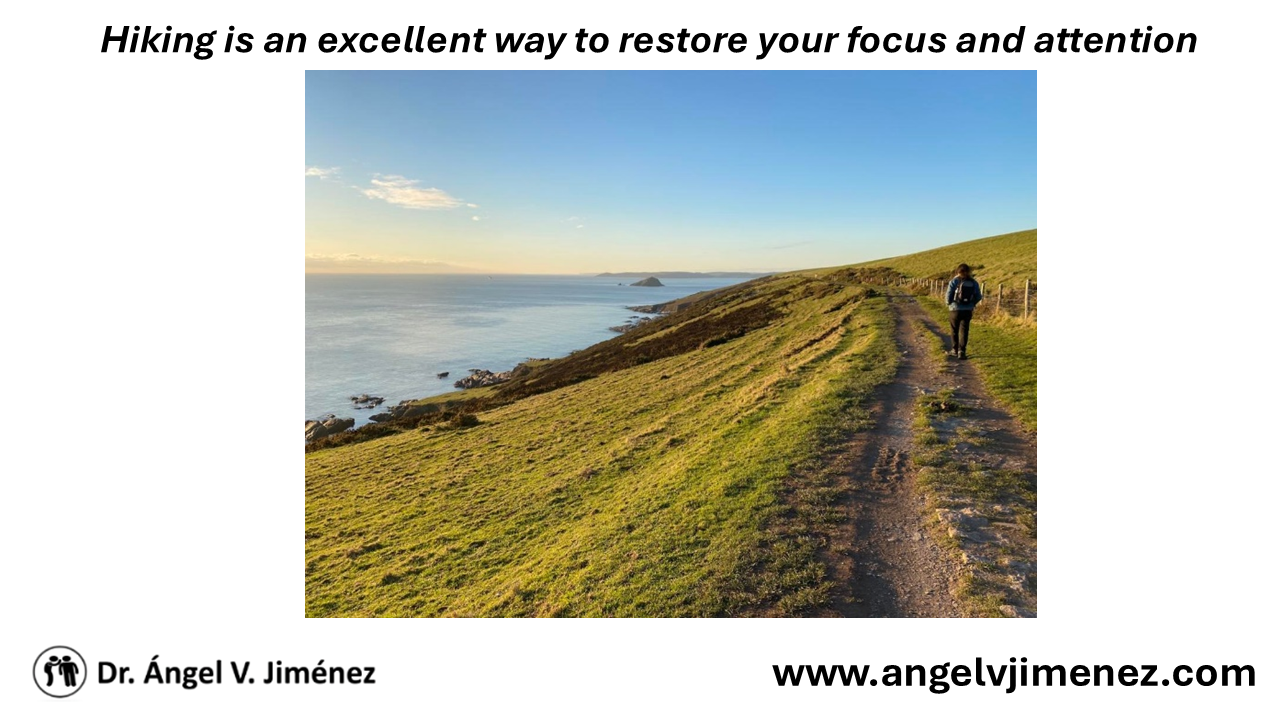
Me walking along the SW Coast Path in Devon, UK
On the other hand, activities like running, weightlifting, walking (especially in nature), dancing, surfing, yoga, meditation, or even chatting with loved ones—whether face-to-face, on the phone, or via Skype—can put your mind at ease, improve your mood, and restore your energy.
These activities replenish your focus and attention, making them essential for sustained productivity and deep work.
So, don’t just treat your time off work as sacred—fill it with sacred activities. Choose relaxing and enjoyable activities that improve your life and focus, rather than wasting time on habits that harm your productivity.
5. Reconciling Work and Wellbeing
In this article, I’ve focused on how the virtuous cycle of focused work benefits your productivity and professional goals. However, its benefits go far beyond work.
By being more focused at work, selective with your tasks, treating your time off as sacred and filling it with meaningful activities, you’ll achieve the often-elusive work-life balance.
Even more importantly, you’ll become a remarkably productive professional who also enjoys a fantastic life outside of work.
I hope I’ve convinced you to embrace the virtuous cycle of focused work.
See you outside the office.
Ángel
Dr. Ángel V. Jiménez
Ángel V. Jiménez is passionate about personal development, scientific psychology, and the analysis of human behavior from an evolutionary perspective. He earned his PhD at the University of Exeter (UK), where he studied the processes of status acquisition and interpersonal influence, and the role of prestige in social learning. After completing his doctorate, he conducted postdoctoral research at Brunel University London and the University of Exeter. He currently teaches quantitative psychology, combining his academic expertise with his passion for scientific outreach. Through this website, he shares practical and thought-provoking content on personal development, psychology, and evolutionary science, helping you better understand human nature and apply this knowledge effectively to improve your life.
References & Resources
These are the materials I consulted to prepare this article. Interested readers can review them to delve deeper into the topics discussed.
Books
Gazzaley, A. & Rose L.D. (2017). The distracted mind. Ancient brains in a high-tech world. MIT Press.
Koch, R. (2022). The 80/20 principle. The secret to achieving more with less. Nicholas Brealey Publishing.
Newport, C. (2016). Deep Work: Rules for Focused Success in a Distracted World. Grand Central Publishing
Scientific Research
McDonnell, A.S., Strayer, D.L. (2024). Immersion in nature enhances neural indices of executive attention. Scientific Reports 14, 1845.
Brailovskaia, J., Siegel, J., Precht, L. M., Friedrichs, S., Schillack, H., & Margraf, J. (2024). Less smartphone and more physical activity for a better work satisfaction, motivation, work-life balance, and mental health: An experimental intervention study. Acta Psychologica, 250, 104494.
Blog Posts
Jiménez, Á.V. (2023). Internet Distraction: A Complete Guide to Overcoming It. The Adventure of Success.
RECENT POSTS
Learning from the Best: A Success Secret or An Evolutionary Instinct?
Success leaves clues, and both personal development and evolutionary science experts agree: learning from the best is a powerful yet underused strategy. Here’s a deep dive into the evidence from personal development and evolutionary human science.
Social Learning Strategies: How to Select Your Learning Sources
Not all social learning is equal: choosing the right sources can make all the difference. The evolutionary science of social reveals powerful strategies for selecting who to learn from. Here’s a deep dive into the evidence and how to apply each strategy effectively.
Affiliate Disclosure
This website participates in the Amazon Affiliate Program and other affiliate programs, which means I may receive a commission for purchases made through affiliate links. This does not affect the price you pay and helps me keep the content free and high quality. I appreciate your support.




